Play (More!)
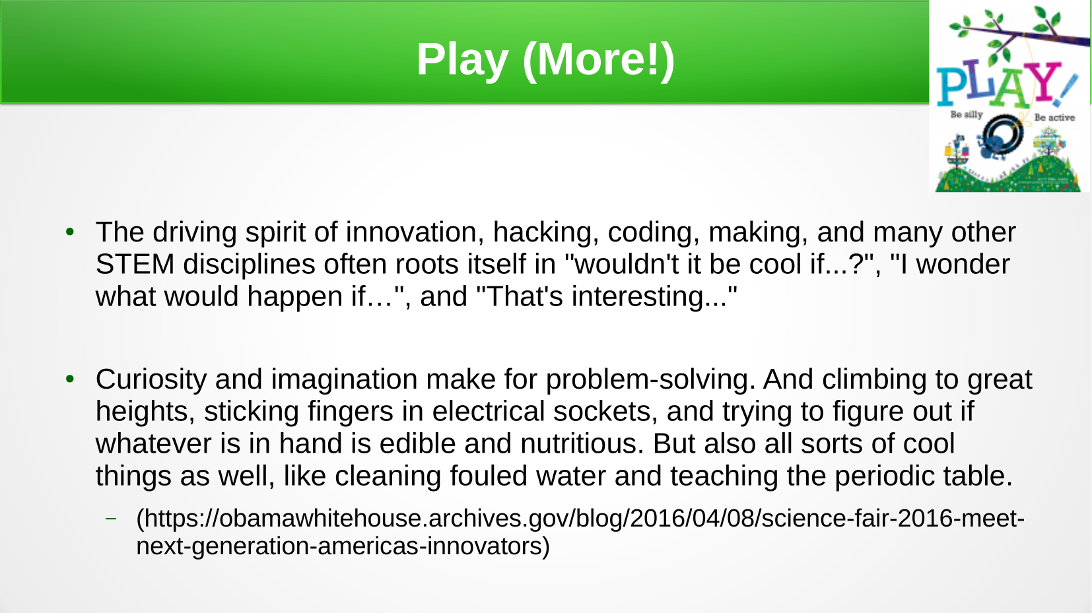
We loop back around to play again at the end, because the driving spirit of innovation, hacking, coding, making, and many other STEM disciplines often roots itself in "wouldn't it be cool if...?", "I wonder what would happen if...", or "That's interesting...". At the heart of each of these ideas is curiosity and imagination, the twin desires to find out about something and to come up with a way of testing or solving the problem that appears from curiosity. Young children have both of these impulses in spades - it's what drives them to climb to great heights, stick their fingers in electrical sockets, and try to figure out if whatever they have in their hands is edible and nutritious. But also to ask 3D printer companies if they want information on how easy their products are to use by an eight year-old, launch vehicles into space, teach the periodic table to the visually impaired, mentor young girls into making video games, build race-winning solar cars, build solar-powered electric fuel stations, improve the efficiency of their microwaves, and clean fouled water Solving problems, whether on a world revolution scale, on a "goodness this really annoys me" scale, or a "hey, my friend needs something to help them cope with the universe, this might work" scale, is a necessary part of the skillset of being a human.
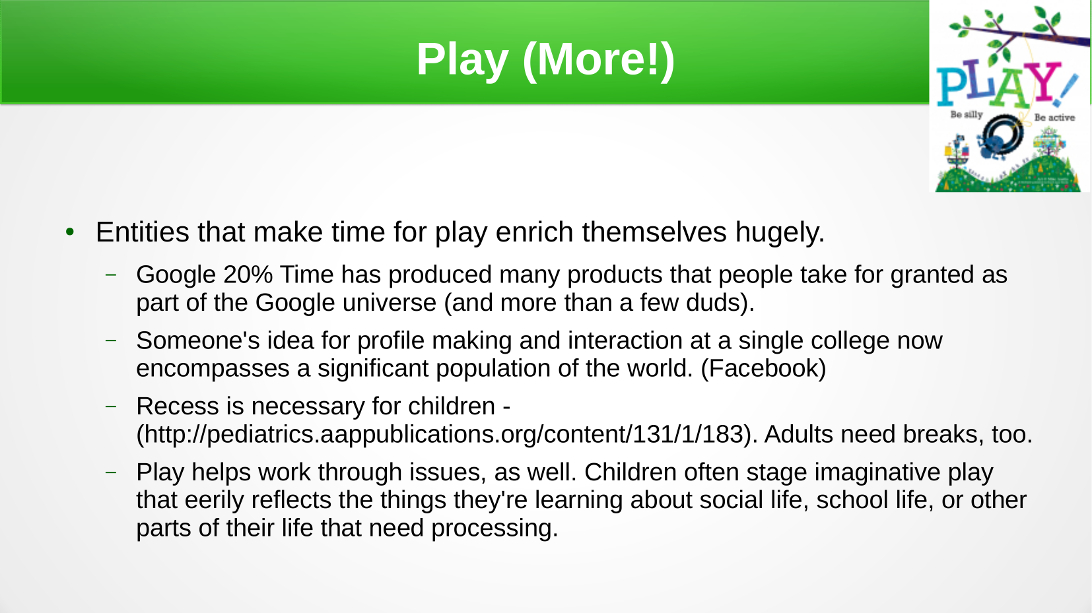
Entities that make time for play enrich themselves hugely. The Google 20% Time idea, first mentioned in the 2004 IPO letter for Google, has produced many products that people take for granted as part of the Google universe (and more than a few duds). Someone's idea for profile making and interaction at a single college now encompasses a significant population of the world. Recess is necessary for children. Adults need breaks, too, and opportunities to engage in unstructured activities in the same way that kids do. Sometimes a new concept develops into an interesting tangent and helps cement that concept and idea far better than any formal instruction ever would. Play helps work through issues, as well. Children often stage imaginative play that eerily reflects the things they're learning about social life, school life, or other parts of their life that need processing.
The beginning of playing with language are things we've talked about before - picture books who tell separate but related stories and songs, but it also includes jokes and puns (which are signs of literacy), slang, memes, and understanding Yoda or the Russian Reversal.
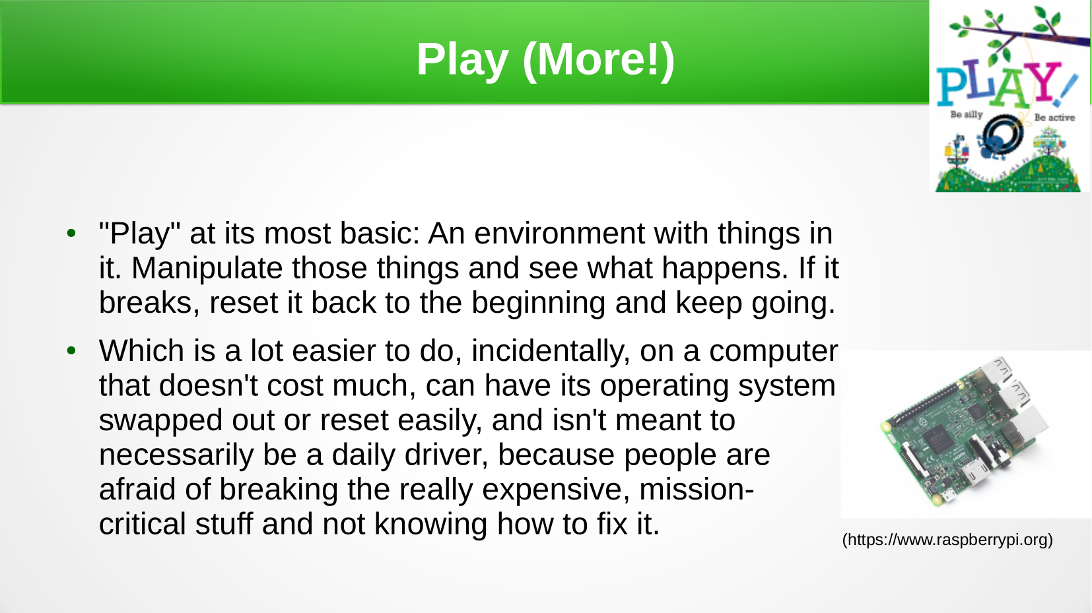
When it comes to software literacy and computer programming languages, "play" in its most basic form is "Here's an environment with things in it. Manipulate those things and see what happens. If it breaks, reset it back to the beginning and keep going." Which is a lot easier to do, incidentally, on a computer that doesn't cost much, can have its operating system swapped out or reset with each SD card inserted, and isn't meant to necessarily be a daily driver, because people are afraid of breaking the really expensive, mission-critical stuff and not knowing how to fix it.
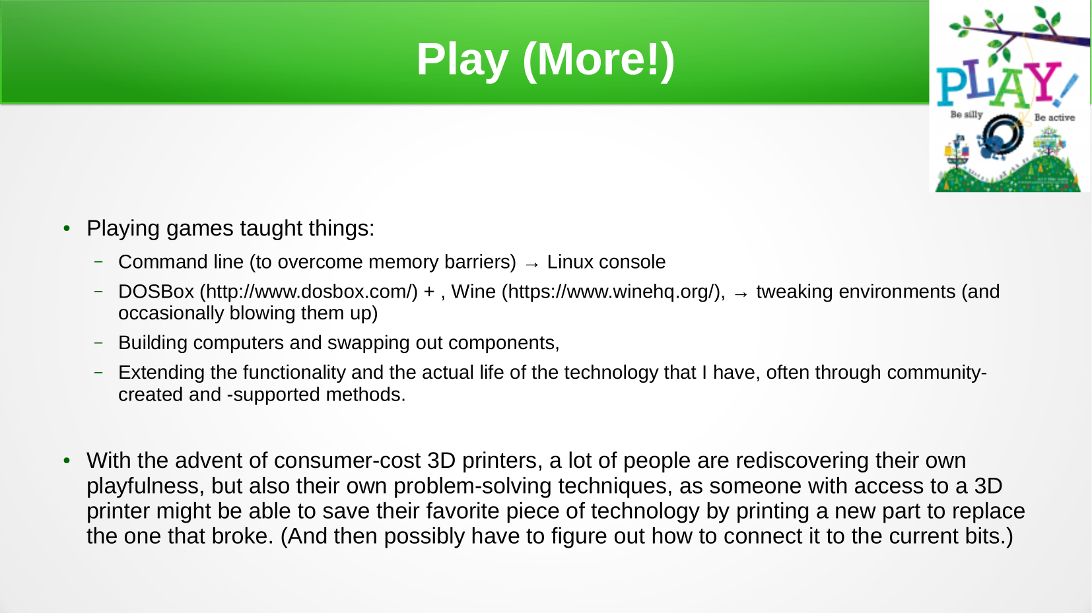
I learned more than I ever needed to about working with a command line because I liked to play games on the computer in a time where memory limitations often meant having to do interesting command-like fixes or to boot into an environment with minimal memory footprint. My comfort with the console in Linux stems from having used DOS to do all sorts of things beforehand. New syntax, sure, but a lot of what I do in the console now is still in service of making sure games run properly, whether through DOSBox, Wine, or trying (and sometimes failing) to get video acceleration to work properly.
Trying to get games to run has also meant comfort with building computers and swapping out components, and in looking for ways to extend the functionality and the actual life of the technology that I have, often through community-created and -supported methods. (Like transforming an old mobile phone into a portable file server.) Because people want to keep playing with their tech until it physically cannot work any more, or upgraded it sufficiently that it's new tech again. They don't want to be caught in a vendor's lock-in or their planned obsolescence date, forever having to purchase new hardware just to be able to access what they already have. With the advent of consumer-cost 3D printers, a lot of people are rediscovering some of their own playfulness, but also their own problem-solving techniques, as someone with access to a 3D printer might be able to save their favorite piece of technology by printing a new part to replace the one that broke. (And then possibly have to figure out how to connect it to the current bits.)
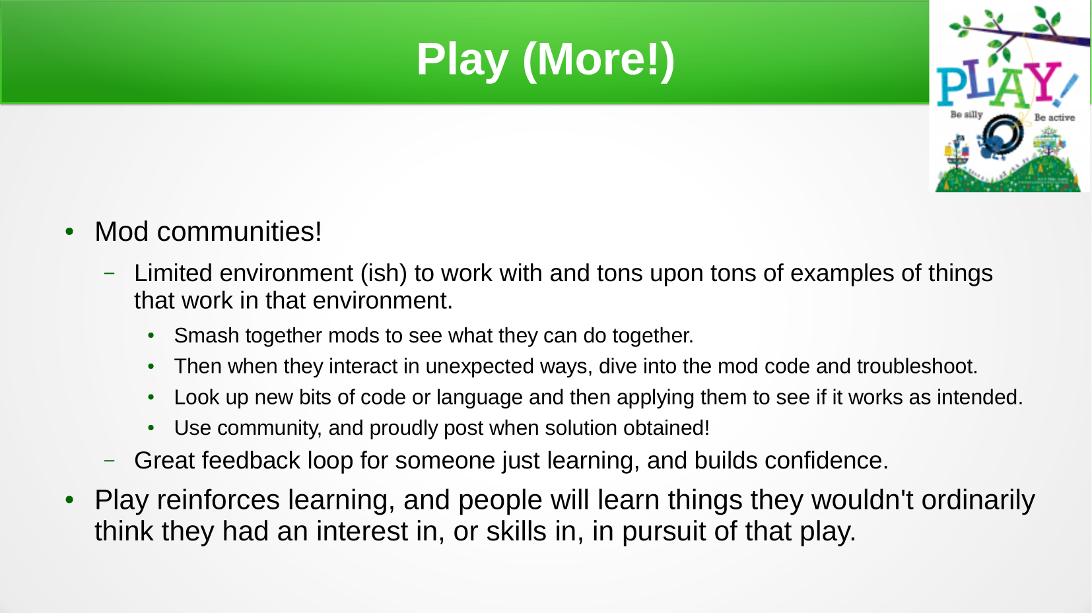
Each of these skills developed from playing or trying to get games to play makes working with programming languages and software easier. Mod communities are great about this! They give someone a limited environment (ish) to work with and tons upon tons of examples of things that work in that environment. First play happens by smashing together mods to see what they can do together. Then when they interact in unexpected ways, a person dives into the mod code to see what the conflicts are, and then has to start thinking about what they want the mods to do when they interact, which often leads to looking up new bits of code or language and then applying them to see if it works as intended. This cycle of troubleshooting, and the heady surge that comes with finding a way that does work, as well as being able to then talk to the community about what happened, is a great feedback loop for someone just learning, and builds confidence. Just like what happens when you have children or language learners who are starting to communicate and get feedback that their language skills are, in fact, working. Play reinforces learning, and people will learn things they wouldn't ordinarily think they had an interest in, or skills in, in pursuit of that play.